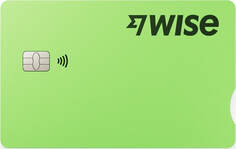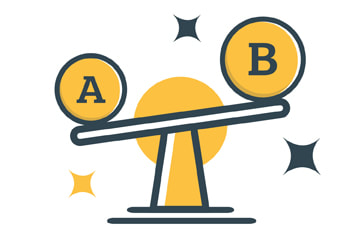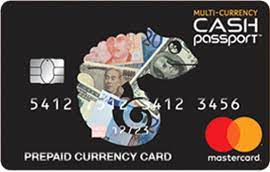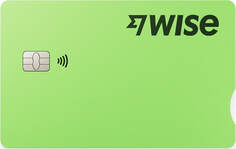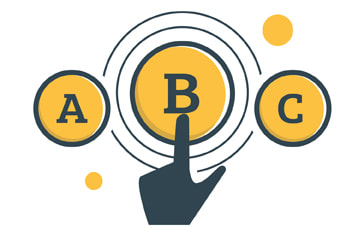Mastercard Cash Passport vs Wise Debit Card - Which Travel Money Card is best for you?
We compare both Travel Money Cards, looking at fees, features, security and ease of use to help you save money when travelling.
Updated 20 October 2023
Summary:
To help you understand the differences between the cards, our review covers:
Advertising disclosure: We may receive payment if you sign up for a card via MoneyHub - please read our advertising policy for more details.
- The Mastercard Cash Passport is widely offered by travel agents, some banks and online. However, our research below confirms the Mastercard Cash Passport offers poor value exchange rates and high fees compared to Wise's Debit Card. We also don't think the Cash Passport is a product Mastercard is actively marketing or intending to improve the fees and rates. For example, in our research, Mastercard list 'STA Travel' as a retailer who sells the Cash Passport despite the company being long bankrupt. We also saw a historical offline notice on a test website, and, when compared to Wise, lower-than-market exchange rates and high fees that don't appear to be decreasing despite being uncompetitive.
- Savvy travellers are increasingly aware that Wise offers far better exchange rates than the Cash Passport. Wise's business model eliminates the fees associated with exchanging currencies, something we argue Cash Passport makes a lot of money from.
- We believe Wise is far simpler to use, and unlike Cash Passport, you don't need to lock in the exchange rate when you top up the card (but if you want to, you still can). You have the freedom to keep your money in NZD and be charged whatever the FX rate when you make your purchases. This avoids the need to think about what the NZD will do, and unlike the Cash Passport, there's no 5.95% penalty for keeping your money in NZD and making a foreign currency transaction. We don't see a justification for this high Cash Passport fee alongside its poor value exchange rates.
- When you're travelling, we believe flexibility, value for money and ease of use are what matter most. Wise is 100% online and behind billions of dollars of daily transactions.
- The Cash Passport, on the other hand, is smaller, can't offer the leading exchange rates Wise can, and, somewhat frustratingly, can close its app and website for hours at a time to do maintenance, as per this example. Coupled with bad exchange rates and a lengthy fee schedule, we believe the Cash Passport offers far less than Wise and costs a lot more.
To help you understand the differences between the cards, our review covers:
- Three Must-Know Cash Passport vs Wise Facts - Fees, Rates and Other Key Differences
- Cash Passport vs Wise Comparison Table
- Cash Passport vs Wise - Pros and Cons
- Alternatives to Travel Money Cards
- Frequently Asked Questions
Advertising disclosure: We may receive payment if you sign up for a card via MoneyHub - please read our advertising policy for more details.
|
MoneyHub Founder Christopher Walsh shares his views on the Cash Passport and Wise:
"Mastercard's Cash Passport is sold widely in 10+ banks, travel agents and retailers. This arguably means you're paying someone else a commission to get the card, which may also be a reason behind the lousy exchange rates as compared to Wise. "Unlike the Cash Passport, Wise cardholders don't need to worry about locking in an exchange rate to avoid a penalty 5.95% charge if they don't fund a 'wallet'. Wise is a global company offering the best exchange rates and an app that helps you have full control over your travel money at any time". "I still expect people to order the Cash Passport - that's their decision but they will lose a lot of money as a result. As the video explains, any comparison you make will always show the Wise debit card giving you more forex for your NZD. This means everything you buy overseas will be cheaper". |
MoneyHub Founder Christopher Walsh
|
Our Top-Rated Travel Money Card - The Wise Debit CardWe like the Wise Debit Card because it lets you:
Our view:
|
Three Must-Know Cash Passport vs Wise Facts - Fees, Rates and Other Key Differences
Both cards, Cash Passport and Wise, are Multi-currency prepaid cardsThis means you can load several currencies onto either card, which is helpful if you visit multiple countries. So, for example, you could have AU$500, £1,000 and €1,000 stored on one card in different 'wallets'. Then, when you top the card up, you can lock in the exchange rate or leave a balance in NZD and move it into a currency when you need it.
Know This: The Wise card allows you to keep money in a NZD wallet, and if you don't have enough in a foreign currency, the balance will be taken from your NZD wallet at the current exchange rate. This is flexible if you're making a short trip or don't want to commit to an exchange rate in advance. Beware of the Cash Passport: If you do the same thing with the Cash Passport, you'll pay a 5.95% fee for using an 'unloaded' currency. This fee is charged "when there are insufficient funds in that currency to complete the transaction and the cost is allocated against other Currency/ies on your card to fund the transaction" per the Cash Passport fee schedule. Our view is that this fee, along with the significantly lower exchange rates (2% to 5% lower compared to Wise), makes the Cash Passport an expensive travel money card. |
What exchange rate do you get? It differs between cardsThis is very important to distinguish between the two cards. The Cash Passport uses a rate that is 'fixed' for four hours. Our research confirms that the rates used for sample currencies can be around 2% to 4% lower than the rates used by Wise. The differences can be significant and add up the more you spend. Wise uses the interbank rate and adds a small commission, around 0.35%, and you can see how much currency you'll get at any time by visiting their website and using the currency tool.
|
What fees and charges do you pay? Cash Passport and Wise have very different fees.1. Cash Passport is arguably fee-heavy. If you buy the card via a retailer, there is a one-off card fee - this will either be "The greater of 1.0% of the initial load/reload amount or NZD$10.00". For example, if you purchase a Cash Passport from a travel agent and load NZD$2,000, you would be charged $20 (NZD$2,000 x 1.0%=NZD$20) given that NZ$10 is the minimum charge. The less you load initially, the lower the fee, which we find confusing.
Withdrawing money? If you take money out at an ATM, there is fixed fee (depending on the currency withdrawn). You can see these in the fee schedule. Warning: Cash Passport also charges a "Currency conversion fee" if you use the card in a currency not loaded. This is the "Mastercard rate" plus "5.95% of the transaction value". This means you'll need to constantly fund a currency every time you top up to avoid the risk of being stung by this high fee. In comparison, you can top up a Wise card with NZD and any transaction made is done at the interbank rate, so you'll get the best exchange rate and the standard Wise fee. We estimate this to save people 90%+ of the costs charged by Cash Passport for most currencies. 2. Wise, by comparison, is far more straightforward and has a one-off $14 card application fee. This is charged when you order the card and covers the costs of posting it to you. All subsequent renewals are free, so you only pay this fee once. After that, you can load 1 cent or up to a million dollars for free via your bank account (or pay a surcharge to use a debit or credit card). There are no closure fees, inactivity fees or penalty currency conversion fees. The card is yours for life and will be reissued for free when it expires. Pro Tip: Wise is far simpler to use, and you don't need to lock in the exchange rate when you travel. You can keep your money in NZD and be charged whatever the FX rate is during your purchases. This avoids the need to think about what the NZD will do, and unlike the Cash Passport card, there's no 5.95%+ penalty for keeping your money in NZD and making a foreign currency transaction. |
Cash Passport vs Wise Comparison Table
The table below shows the differences between the cards. However, it's hard to see how this makes a difference until you load money onto a card.
The video below explains how you'll pay much more using the Cash Passport Mastercard when compared to the Wise Debit Card.
The video below explains how you'll pay much more using the Cash Passport Mastercard when compared to the Wise Debit Card.
Card Name |
Number of currencies |
What exchange rate will you get? |
Card issue fee |
Load fees |
Cash Passport |
10 |
The Mastercard Cash Passport's own rates |
1% of the initial top-up value (if in store, free online) |
Free (but cardholders pay the Cash Passport FX rate which is below-market) |
Wise Debit Card |
50+ |
Interbank rate + around 0.35% |
$14 |
Free (bank transfers) |
Topping up $1,000 into EUR, USD, AUD and GBP - Cash Passport vs Wise
- The video below shows you how much foreign currency you will get with NZ$1,000. The results show a significant difference in how much money each card gives you, with Wise having the clear advantage.
- Try it yourself now for whatever currency you need using the Cash Passport tool and the Wise tool. All prices are live.
- The differences add up and this is the main reason why we favour Wise over Cash Passport. You're paying less for exactly the same thing.
- We found that the difference is anywhere between 2% and around 5%, meaning Wise 'charges' a lot less for foreign currencies than Cash Passport.
Cash Passport vs Wise - Pros and Cons
|
Cash Passport
Pros:
Cons:
More details: Cash Passport Travel Money Card |
Wise Travel Money Card
Pros:
Cons:
More details: Wise Travel Money Card |
Alternatives to Travel Money Cards
Both the Cash Passport and Wise offer a safe way to carry cash overseas. However, they are prepaid cards, so you can't borrow if you have an emergency, nor can you use them to hire rental cars. We have reviewed the best debit and credit cards for travel - this guide explains the best options and what you need to know.
Our view: A credit card with low (or zero) currency fees on overseas spending is arguably a sensible option for purchases made when you're travelling. However, you will need to pay off all of the balance every month to be cost-effective. We believe banks are not competitive regarding the fees charged when using a debit or credit card for a foreign currency purchase. However, there are some exceptions that this guide outlines.
Our view: A credit card with low (or zero) currency fees on overseas spending is arguably a sensible option for purchases made when you're travelling. However, you will need to pay off all of the balance every month to be cost-effective. We believe banks are not competitive regarding the fees charged when using a debit or credit card for a foreign currency purchase. However, there are some exceptions that this guide outlines.
Frequently Asked Questions
Are either of these Travel Money Cards cards secure?
- Wise: The Wise card offers contactless purchases and Apple Pay and GooglePay integration (see below). If you're withdrawing money, a PIN is required.
- Cash Passport: Cash Passport is secured via PIN and also offers contactless payments.
Do either cards connect to GooglePay or Apple Pay?
Wise integrates to both, and the setup is very easy. Unfortunately, the Cash Passport doesn't offer any integration with its New Zealand product, so you will need the physical card to make purchases.
Can I claim for a chargeback if something goes wrong with a purchase?
Wise had a anti-fraud support desk, Cash Passport suggests cardholders call their helpline. However, for chargeback specific information, we suggest following the MasterCard or Visa chargeback scheme, which we outline here.
What happens if Mastercard (the provider of the Cash Passport) or Wise goes bust?
This question is reasonable given competitor (and major player) Travelex and its parent company Finablr almost went bust in early 2020 before later going into administration.
It's unlikely the Mastercard Cash Passport product will go bust given its association with global giant Mastercard. However, the Cash Passport website doesn't offer information about this very important consideration.
Wise states that it "uses two approaches to safeguard your funds". This includes depositing the funds at banking institutions and investing them in government-backed liquid assets, primarily government bonds".
It's unlikely the Mastercard Cash Passport product will go bust given its association with global giant Mastercard. However, the Cash Passport website doesn't offer information about this very important consideration.
Wise states that it "uses two approaches to safeguard your funds". This includes depositing the funds at banking institutions and investing them in government-backed liquid assets, primarily government bonds".
Where can I use the Cash Passport and Wise travel money cards?
Anywhere Visa or Mastercard is accepted - so, effectively, in millions of places worldwide. Of course, this means any ATM and website as well.
However, there are some exceptions. For example, hotels may require a credit card (but not always) as a pre-authorisation check. Car rental agencies also usually require a credit card, so be conscious of this when planning a trip.
However, there are some exceptions. For example, hotels may require a credit card (but not always) as a pre-authorisation check. Car rental agencies also usually require a credit card, so be conscious of this when planning a trip.
Should I pay in NZD or the local currency?
Too often, 'Pay in NZD' flashes up on a card machine or ATM when you're overseas. This is called dynamic currency conversion and is usually best avoided. It always uses a lower-than-market rate to make money for the retailer and/or the card machine operator. Our guide to foreign currency exchange has more details.
What happens if my travel money card is lost or stolen?
With Wise, you can freeze the card using the app to prevent contactless payments. You can unfreeze the card if and when you find it again. If you need a new card, it will be mailed to you.
The Cash Passport website requests that anyone who has lost or had their card stolen should call their helpline.
The Cash Passport website requests that anyone who has lost or had their card stolen should call their helpline.
Our Top-Rated Travel Money Card - The Wise Debit CardWe like the Wise Debit Card because it lets you:
Our view:
|
Related guides and resources:
Travel Money by Country:
- Best Travel Money Cards
- Travelex vs Wise Travel Money Card
- OneSmart vs Wise Travel Money Card
- Wise Debit Card Review
- Foreign Currency Debit and Credit Card Fees
- Foreign Currency Exchange
Travel Money by Country:



